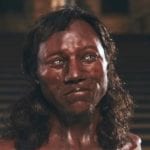 Weird Stuff
Weird Stuff  Weird Stuff
Weird Stuff  Miscellaneous
Miscellaneous 10 LEGO Facts That Will Toy with Your Mind
 Misconceptions
Misconceptions 10 Widespread Historical Myths and the Texts That Started Them
 Crime
Crime 10 Incredible Big-Time Art Fraudsters
 Movies and TV
Movies and TV 10 Most Influential Fictional Objects in Cinema History
 Our World
Our World Top 10 Real Almost‑Cities That Never Materialized
 Technology
Technology 10 Unsettling Ways Big Brother Is (Likely) Spying on You
 Music
Music 10 Chance Encounters That Formed Legendary Bands
 Space
Space 10 Asteroids That Sneaked Closer Than Our Satellites
 Sport
Sport The 10 Least Credible Superstars in Professional Sports
 Weird Stuff
Weird Stuff 10 of History’s Greatest Pranks & Hoaxes
 Miscellaneous
Miscellaneous 10 LEGO Facts That Will Toy with Your Mind
 Misconceptions
Misconceptions 10 Widespread Historical Myths and the Texts That Started Them
Who's Behind Listverse?

Jamie Frater
Head Editor
Jamie founded Listverse due to an insatiable desire to share fascinating, obscure, and bizarre facts. He has been a guest speaker on numerous national radio and television stations and is a five time published author.
More About Us Crime
Crime 10 Incredible Big-Time Art Fraudsters
 Movies and TV
Movies and TV 10 Most Influential Fictional Objects in Cinema History
 Our World
Our World Top 10 Real Almost‑Cities That Never Materialized
 Technology
Technology 10 Unsettling Ways Big Brother Is (Likely) Spying on You
 Music
Music 10 Chance Encounters That Formed Legendary Bands
 Space
Space 10 Asteroids That Sneaked Closer Than Our Satellites
 Sport
Sport The 10 Least Credible Superstars in Professional Sports
Top 10 Shocking Shallow Grave Discoveries
More often than not, what lies in a shallow grave tells the nightmare of someone’s dreadful ending. Although we can’t know the details of each person’s life, we can piece together how that life ended.
Not every tragedy is the same, of course, and the following 10 stories reveal just that. From unearthing an entire municipality to unmasking psychotic mass murderers, such horrid discoveries lend a voice to the forgotten victims while demonstrating the cruel and deranged world in which we live.
10 Mass Extermination
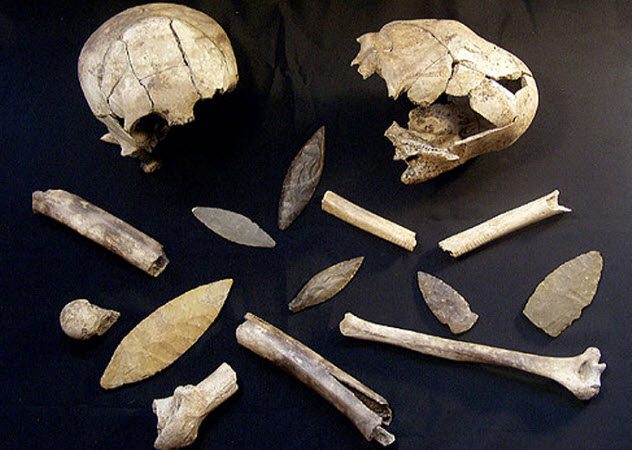
In 2005, forensic experts in Guatemala were called after archaeologists discovered a mass grave among the ruins of the ancient Mayan city of Cancuen. As many as 50 skeletons were discovered—victims of murder who were tortured and dismembered for the sole purpose of exterminating the entire municipality.
The grisly massacre occurred around AD 800 when Cancuen was invaded. The conquerors rounded up the masses. Then the Mayan citizens were hacked to death, bludgeoned, or decapitated by the thrusts of lances and the blows of axes.
Be it men, women, or children, the vicious mutilations were indiscriminate and no life was spared. Even the king and queen suffered the same fate. Most of the bodies were interred in shallow graves.
After the palace and monuments were methodically destroyed, the city of Cancuen was abandoned. Interestingly enough, the unidentified victors took the trouble to bury the dead in their finest robes and adornments, a sign of respect for a civilization they hard-heartedly left in ruins.[1]
9 Remains Of The Past
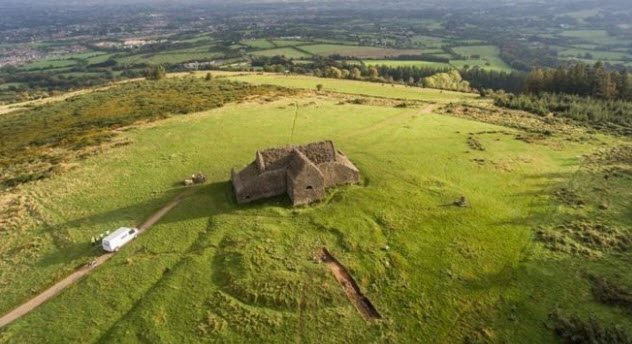
In the mountains of Dublin sit the remains of the Hellfire Club, an infamous 18th-century establishment built from the stones of an ancient tomb. As the legend goes, the construction of the building in 1725 required the demolition of a tomb which was believed to be an ancient passageway.
The destruction was said to have “enraged a demon that blew the wooden roof off the original building.” Nonetheless, the notorious establishment became home to young aristocrats famously described as blasphemers, bacchanalians, and monsters.
The assembly of egotistical nobles would partake in nonstop drinking sessions late into the night and practice black mass rituals. Black cats were said to have been slaughtered by priests for their misconstrued ceremonial beliefs. At one point, there were stories of the sacrifice of a dwarf with a huge head.
Though it’s true that such tales are often nothing more than local folklore, a discovery in 1971 resurrects questions about the validity of the legend. That year, while plumbing work was being done on the premises, a shallow grave was found. It contained the skeletal remains of a dwarf along with a brass figurine depicting “a horned and tailed devil thumbing its nose.”[2]
The legend continues.
8 Fisher’s Ghost
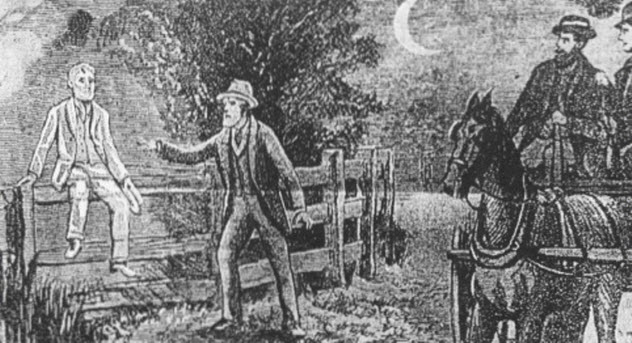
On June 17, 1826, resident Frederick Fisher mysteriously disappeared from Campbelltown, Australia. According to his neighbor, George Worrall, Fisher had given power of attorney over his estate to Worrall before Fisher returned to his home country of England.
Four months after Fisher’s disappearance, Campbelltown local John Farley claimed to have seen the ghost of Fisher sitting near a bridge, pointing to a paddock beyond the creek. Given the puzzling circumstances surrounding Fisher’s disappearance, police searched the premises to which the “ghost” had pointed. Then they discovered that the land belonged to George Worrall.
Further investigation of the paddock uncovered a shallow grave that held the remains of the murdered Fisher. It took a jury a total of 15 minutes to find Worrall guilty of murder. He was sentenced to death and hanged three days later on Monday, February 5, 1827.
From newspaper accounts to verbatim notes by the chief clerk of the Supreme Court, Worrall’s trial remains the best-documented colonial legal drama in Australian history.[3]
7 Cold Feet

On September 9, 2016, a county deputy found a bag in Oregon’s Tillamook Rainforest containing the birth certificate of missing 20-year-old Anna Proietti. Following a search of the surrounding area, deputies recovered Proietti’s remains in a shallow grave.
An autopsy revealed that she had been dead since mid-July. The probable cause was a drug overdose or traumatic asphyxia. Soon after, Proietti’s husband, Henry, was indicted on manslaughter charges.[4]
What unfolded after months of court hearings not only puzzled detectives but challenged the Tillamook County District Attorney’s Office as to how to proceed with the charges at hand. According to court documents, Proietti had a history of self-harm and suicide attempts. She and her husband of one year had also made a suicide pact to end their lives.
This led the couple to the remote location on July 16. Henry admitted to detectives that he had intentionally aided his wife’s suicide there before having second thoughts about taking his own life. Following a plea agreement that included Henry paying restitution for Anna’s funeral expenses, the charges against him were reduced to attempted second-degree manslaughter. He was sentenced to three years in prison.
6 Don Juan’s Romantic Garden

In May 2014, 25-year-old French national Mina El Houari traveled to Morocco to meet a man she had met online. The two had been chatting for several months, and El Houari saw potential for a future romance. When the young lady failed to check in with her family back in France, Moroccan police became involved.
After raiding the home of El Houari’s date, police discovered muddy trousers, a shovel, and a freshly dug shallow grave in the backyard of the residence. The man reportedly confessed to burying El Houari in a panic after she suddenly and inexplicably collapsed. What he did not realize, however, was that El Houari was still very much alive.[5]
Sadly, the young woman who was looking for love was an undiagnosed diabetic who had fallen into a diabetic coma. Not realizing that she was still breathing, brainless Don Juan buried her alive in the makeshift grave in his garden. After providing a full confession, he was arrested and charged with involuntary manslaughter.
5 ‘The Sons Of Satan’
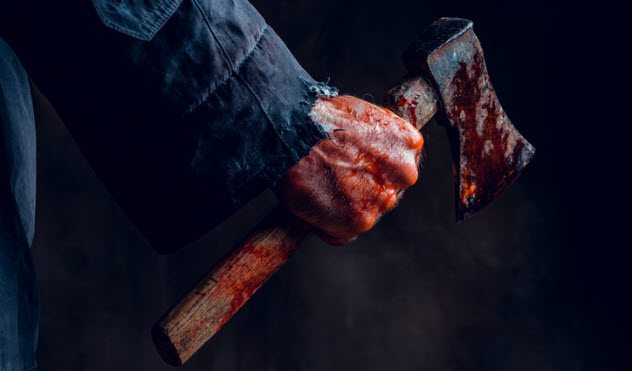
On June 3, 1970, 29-year-old Florence Nancy Brown said one final goodbye to her husband as she left their home for a meeting at the school where she taught special needs children. Thirteen days later, a hiker in southern California stumbled upon a shallow grave in an orange grove containing the butchered remains of the mother of four.
Brown had been stabbed 20 times. Her right arm was missing as well as her heart. By the end of June, the vile predators were captured. The cowardly gang of vagrants called themselves “The Sons of Satan.” They were strung out on drugs and had cannibalistic cravings.
The “father” of the group, 20-year-old Steven Hurd, boasted that he had eaten Brown’s heart in honor of Satan. Fortunately, the self-proclaimed evil prophet was sentenced to life in prison despite his attorney portraying him as “a helpless pawn of delusions” cast by the Devil.
Sadly, Brown was not the only victim of the depraved gang. One day earlier, Hurd had butchered 20-year-old newlywed Jerry Carlin with a hatchet at the gas station where he worked.[6]
4 Black Hope Cemetery
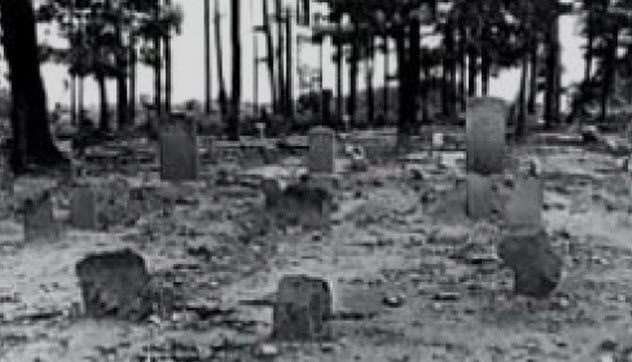
When Sam and Judith Haney settled in their Texas dream home in the early 1980s, they were unprepared for the ominous warning they were about to receive from a mysterious old man who showed up at their door. Leading them into the backyard, the man pointed to the ground and claimed that graves lay beneath.
The Haneys soon discovered that their home was built on top of Black Hope Cemetery where nearly 60 former slaves were laid to rest in shallow pauper graves. Following the disinterment of two pine caskets, the Haneys—along with a dozen other neighbors—began experiencing paranormal activity.
Unearthly sounds, putrid smells, and frightening supernatural apparitions led the neighborhood residents to believe that they were becoming victims of a menacing presence. The Haneys eventually sued the builder of the subdivision for not disclosing the history of the land.[7]
In the end, their case was thrown out and they were ordered to pay $50,000 in court costs. Sam Haney explained, “At that point, we decided to file bankruptcy. All in all, we ended up losing the case, losing the money, losing the house.”
Frustrated and determined to prove that their home was on top of a cemetery, fellow neighbor Jean Williams and her daughter, Tina, attempted to unearth the caskets buried in their yard. But they inexplicably fell ill. Two days later, Tina was dead after suffering a massive heart attack, leaving her mother to suffer the burden of the blame.
3 ‘Horror House’

In March 1976, authorities were alerted to rising smoke emerging from a heavily wooded area in North Carolina. Park rangers discovered a shallow grave containing five dead bodies that had been set ablaze. The victims were identified as the Bishop family who had recently been reported missing by neighbors in Bethesda, Maryland.
Upon entering the family’s residence, police found a “horror house” painted in blood from top to bottom. Further investigation revealed that the owner of the residence, William Bradford Bishop Jr., a 39-year-old Foreign Service officer, had been passed over for a promotion he had strongly desired on March 1.
That day, Bishop purchased a gas can and a sledgehammer from a local hardware store, went home, and fatally bludgeoned his wife, his three young sons, and his mother. Then he loaded their bodies into the family station wagon to head east.[8]
Since that fateful spring day, there have been three credible sightings of Bishop, one each in Sweden, Switzerland, and Italy. In 2014, the family madman was added to the FBI’s Ten Most Wanted list.
To date, detectives remain haunted by the discovery of the crime scene, specifically the hammer marks on the ceiling above the children’s top bunk bed. Office Mike McNally said, “The number of marks, you know, how many times he must have hit his son.”
2 The Peach Orchards
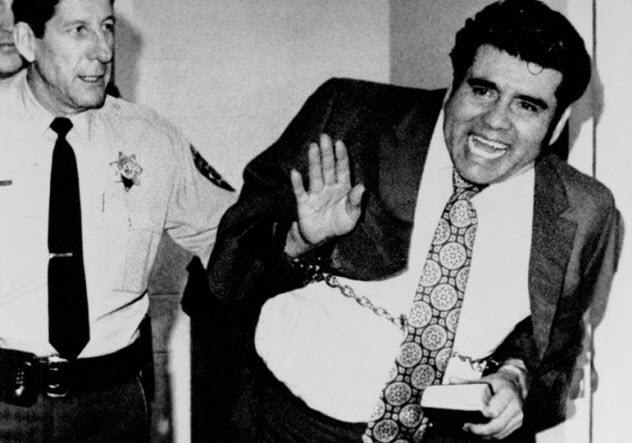
On May 19, 1971, peach grower Goro Kagehiro was inspecting his orchard in Yuba City, California, when he discovered a freshly dug hole on his land measuring 1.8 meters (6 ft) long and 0.9 meters (3 ft) deep.
The following day, Kagehiro notified authorities after someone had returned to his property to fill in the hole. After a few minutes of digging, the authorities uncovered the body of a man who had been repeatedly stabbed and bludgeoned.
A similar grave was found by a different farmer three days later. As a result, searches were conducted in the surrounding peach orchards. In all, 25 bodies in various stages of decomposition were unearthed from the soil. The victims, many of whom were white male vagrants or transient farmworkers, were mutilated beyond recognition.
A receipt for meat in one of the graves led police to Juan Corona, a 37-year-old contractor who was a diagnosed paranoid schizophrenic with a hair-trigger temper. A search of Corona’s residence turned up a machete, blood-splattered clothes, and a notebook containing the names of a few of the victims.
In the largest mass murder trial to that date in US history, Corona’s defense attorney argued that his client was “hopelessly heterosexual” and that the killings were motivated by his rage toward homosexuals. On January 18, 1973, Corona was found guilty and received 25 consecutive life sentences.
Eleven months later, a fellow inmate stabbed Corona more than 30 times and gouged out his left eye with an X-Acto knife. Despite the seriousness of his injuries, Corona survived.[9]
1 Prime Real Estate
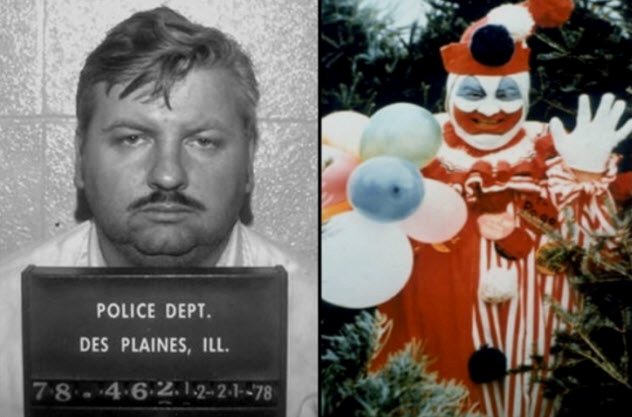
In the 8200 block of West Summerdale Avenue in Chicago, 29 bodies were discovered buried in the crawl space of John Wayne Gacy’s red-and-brown brick home. In the search for remains, the home was razed in April 1979 and sat vacant for nine years until the construction of a new residence was underway.
Many neighbors were understandably pleased, although some believed that a monument for the victims should have been erected on the site of the largest mass murder in Chicago’s history. Others in the neighborhood thought that the new owners were “crazy” to build on grounds that may house the souls of the dead.[10]
Interestingly enough, countless locals were perplexed that the vacant lot had remained barren since the day of the original home’s demolition. The fact that grass and even weeds had failed to grow on the property’s eerie soil mystified neighbors, generating numerous stories about the place being haunted by the ghosts of Gacy’s victims.
Gacy was executed on May 10, 1994, for the murder of at least 33 teenage boys and young men. Even now, rumors persist that other victims of Gacy remain buried in and around the city of Chicago, forever lost and never to rest in peace.
Adam is just a hubcap trying to hold on in the fast lane.
Read about more shocking grave discoveries on 10 Disturbing Mass Graves Discovered Recently and Top 10 Hidden Grave Sites Found With Satellite Images.
